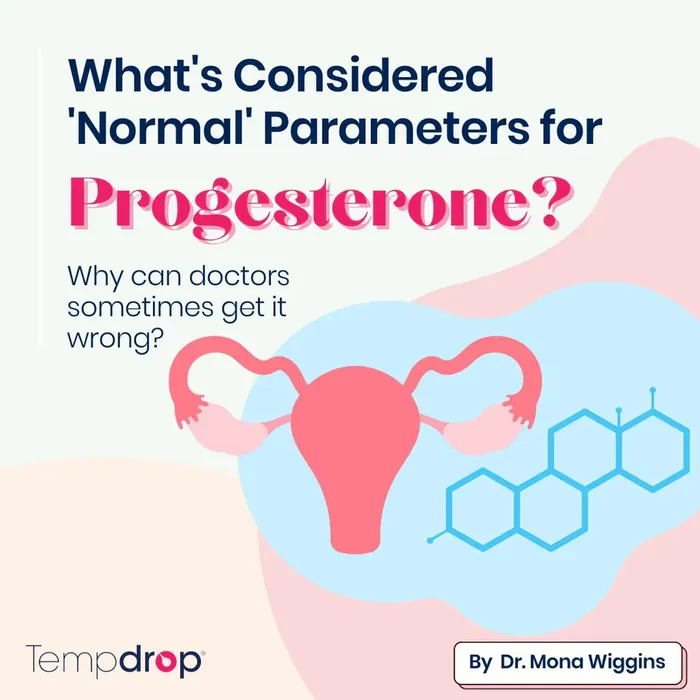What's Considered 'Normal' Parameters for Progesterone?
Published February 5, 2025.

"As a doctor of nursing practice and functional medicine practitioner, I often get asked about lab levels and what is considered “normal” or ideally optimal. Progesterone is one of the labs that can be quite tricky to understand and one that I find many traditionally trained doctors don’t fully understand."
In this article we'll explore progesterone testing, what's considered normal and optimal in a traditional setting and what you can do to understand your own progesterone levels.
As females, we have two dominant hormones in our menstrual cycles, estrogen and progesterone.
- Estrogen is the hormone that is dominant in the first part of our cycle, before ovulation.
- Progesterone is the hormone that is produced after ovulation by the corpus luteum. This temporary endocrine gland is formed from the ruptured follicle that releases the egg in the process of ovulation.
How do we measure progesterone?
Progesterone is best measured in the mid-luteal phase, approximately 5-7 days after confirmed ovulation. Some medical providers would suggest over 15ng/mL is a healthy level, other functional providers may say over 20ng/mL would be ideal. However, we should never look at a lab number alone to make decisions about the health of a cycle or to determine whether to offer treatment.
I always recommend that progesterone be cross-referenced with the someone’s full health history, including:
- Their current health status,
- Details about their menstrual cycles/charting,
- Luteal phase length,
- Basal body temperatures
- Records of any spotting,
- Records of any hormone symptoms they are experiencing,
- History of miscarriage and/or successful pregnancies,
- And other pertinent cycle or health data.
This provides a true holistic picture.
Why can doctors sometimes get it wrong?
There are several issues with how progesterone is typically measured that are important to remember when looking at your numbers.
- In a traditional medical setting, it is almost always recommended that progesterone be checked on day 21 of the cycle. This is based on the assumption that everyone ovulates on day 14 and has a 28-day cycle, which we know is not true!* If someone ovulates on day 12 or day 19, the day 21 testing recommendations should be adjusted. However, this often requires both the patient and the provider to be aware of how to interpret cycles and any variances.
- The other issue with testing progesterone levels through blood is that it is released in pulses and, therefore, can fluctuate quite a bit even within a few hours or days. Because of this, some providers recommend checking 3 different progesterone levels in the mid-luteal phase and averaging them. However, I rarely see them done this way, if ever.
- Another issue I see with measuring progesterone is when this is done without taking into account a woman’s actual cycles or symptoms - again, it is just a number that means nothing without a clinical picture.
- The final issue that feels worth mentioning is that many medical providers are not trained deeply enough to understand cycles or hormones to be able to help patients correctly time, or understand, what their body is telling them. Ideally, we recommend working with a provider who has awareness of cycle variances, fertility awareness, and has some experience of reading menstrual cycle charts.
*Based on Tempdrop data alone, less than 10% of women ovulate on or around day 14.
So what do I personally recommend?
As an integrative health practitioner with over 17 years of medical experience, I rarely have a need to formally check progesterone levels with my clients. Instead I look at their clinical picture, detailed cycle charts, and symptoms and make medical decisions based primarily on that. I check progesterone via looking at their luteal phase to see that it has the potential to support a healthy pregnancy (we don’t need bloodwork to determine that). If I’m seeing consistently confirmed ovulation, a 12-16 day luteal phase with nice BBT rise, <1 day of spotting, and little to no luteal symptoms chances are that the client has good progesterone levels. If I’m not seeing these things there are many holistic approaches that we can use to support the body and progesterone levels, or this may be a time to consider progesterone prescriptions.
Final Recommendations
If you are not sure if your progesterone levels are accurate I recommend:
- Working with a trained fertility awareness educator and medical provider, like myself, to review your charts and findings.
- Continue to track your bleeding, cervical fluid, and BBTs
- Look for the signs of a healthy luteal phase mentioned above




